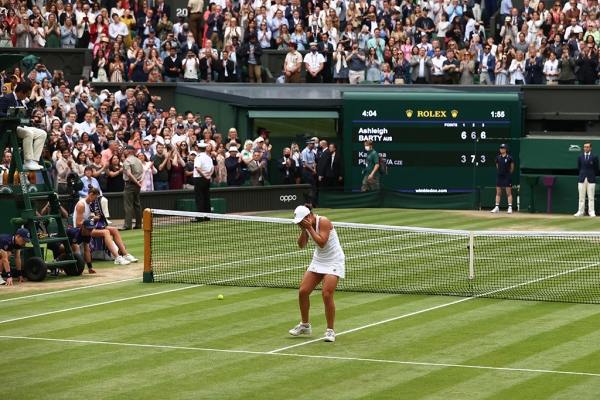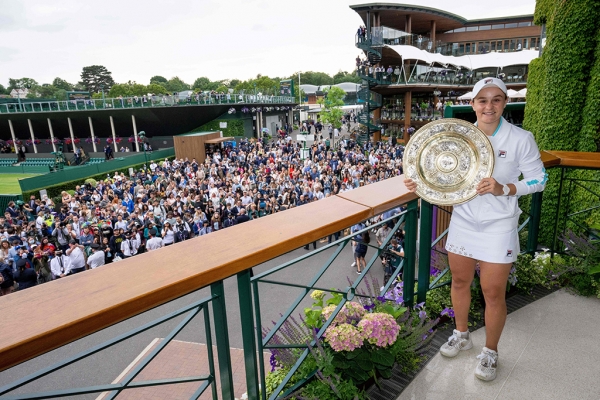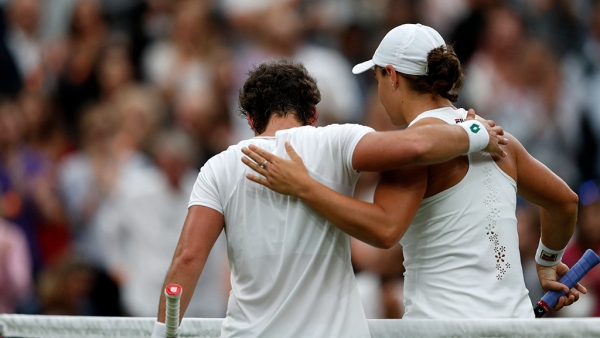“A destiny fulfilled,” said commentator Sam Smith as Ash Barty clinched the 2021 Wimbledon title with a dramatic three-set win over Karolina Pliskova.
And it was clear Barty, too, recognised the significance of what had unfolded, given how she responded on Centre Court after hugging her vanquished opponent.
For a player somewhat guarded with the media, introverted in her personality and understated in her reactions, this was perhaps the biggest display of emotion we’d ever seen from the 25-year-old.
“It was the most incredible feeling I think I've ever experienced on a tennis court,” Barty confirmed following her 6-3 6-7(4) 6-3 win, her second Grand Slam singles title.
REPORT: Barty defeats Pliskova to win Wimbledon title
“There was certainly disbelief. I think I've worked so hard my whole career with my team and with people that mean the most to me to try and achieve my goals and my dreams.
“To be able to do that today was incredible.”

Central to this victory was Barty’s ongoing process of “learning” and “growth”, which she referenced during her championship fortnight. And perhaps the biggest evidence of this came in the past year, when, for the first time, Barty summoned the courage to publicly reveal her biggest career dream was winning Wimbledon.
On the eve of the tournament, she described that process as “putting my hopes and dreams out into the universe and chasing them”.
The “destiny” Smith referenced when Barty ultimately triumphed?
It certainly felt that way from the moment the Australian arrived at the All England Club.
A symbolic, emotional path
A few weeks earlier, a “heartbreaking” hip injury had cruelly ended her Roland Garros campaign in the second round.
It emerged that it very nearly prevented her from even playing at Wimbledon, let alone winning it.
“(My team) kept a lot of cards close to their chest and didn't tell me a lot of the odds, didn't tell me a lot of the information that they'd got from other specialists. There weren't too many radiologists in Australia who had seen my injury,” Barty revealed.
“I think them not telling me that just proved how much we were against the odds. Sometimes the stars align, you can think positively, you can plan, and … you can chase after your dreams. Certainly now chatting to them it looked a lot less likely than I felt statistically.
“Being able to be able to play here at Wimbledon was nothing short of a miracle.”

She began the tournament symbolically; 50 years after her friend and mentor Evonne Goolagong won her first Wimbledon title, Barty wanted to honour that achievement and sought Goolagong’s permission before FILA designed an outfit paying tribute to Goolagong’s iconic 1971 dress.
Next, defending champion Simona Halep was forced out of the tournament with a calf injury, meaning world No.1 Barty was given the honour of opening Tuesday’s Centre Court schedule in the Romanian’s absence.
Notably, her opponent was Carla Suarez Navarro, the popular Spaniard playing for the final time at Wimbledon in a heart-warming return to the tour after overcoming cancer.
“I think being able to experience opening Centre Court here was something I never, never thought would be possible,” Barty reflected.
“To be able to do that in such an unusual circumstance, I think it was a massive learning curve.”

She took those learnings with her as she progressed.
In a delightful piece of symmetry, Barty, the singles No.1, beat the No.1 doubles players back to back – first Katerina Siniakova in the third round, and then reigning Roland Garros champion Barbora Krejcikova in the last 16.
That set up an historic meeting with against Ajla Tomljanovic, the first Wimbledon quarterfinal between two Australian women in 41 years.
Appropriately, one of those players back in 1980 was Goolagong, who went on to win that year’s title.
By now, Barty was deep in the second week of the Championships, which coincided with NAIDOC Week in Australia – a celebration of the nation’s Aboriginal and Torres Strait Islander peoples’ history, culture and achievements.
Best #NAIDOCWeek ever. Congrats @ashbarty #NAIDOC2021 pic.twitter.com/BjfGfewNWn
— NAIDOC (@naidocweek) July 10, 2021
The fact Barty, an indigenous woman herself, ultimately won her first Wimbledon title 50 years after another indigenous player in Goolagong did the same, in a Goolagong-inspired dress, all while Australia celebrated its indigenous heritage?
Destiny, indeed.
“The stars aligned for me over the past fortnight,” said Barty, who also triumphed on the 10-year anniversary of her girls’ singles victory at the All England Club.
“Incredible that it happened to fall on the 50th Anniversary of Evonne's first title here, too.
“Evonne is a very special person in my life. I think she has been iconic in paving a way for young indigenous youth to believe in their dreams and to chase their dreams.
“She's done exactly that for me as well.”
Learning and growth
Barty once described her junior breakthrough at Wimbledon as both the best and worst thing to happen to her.
It forever set in stone her connection to this most prestigious of tournaments.
2011: Girls' singles champion
— Wimbledon (@Wimbledon) July 10, 2021
2021: Ladies' singles champion
The @ashbarty #Wimbledon evolution pic.twitter.com/T9f9kwz7Zt
But it also perhaps added an extra layer of pressure and significance every time she competed on its famous lawns.
Until 2021, it was the one Grand Slam tournament at which she had comparatively underperformed; a third-round loss in 2018, followed by a fourth-round exit in 2019 as the top seed, were defeats Barty described as some of her “toughest weeks” and “darkest times”.
However, as she continues to demonstrate, she learned from those disappointments, and rose to create something undeniably special.
“I'm a firm believer in everything happens for a reason, the good moments and the tough moments,” she said.
“I think over the past fortnight, I've had massive amounts of growth. Certainly been able to use my experience as a tennis player to get me through some tough matches. I felt like I was able to get better with each match and trust myself more each and every time I stood out on the court.
“Some of my toughest moments have come at Wimbledon. Now some of my most incredible moments have come here as well.”